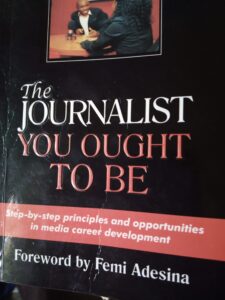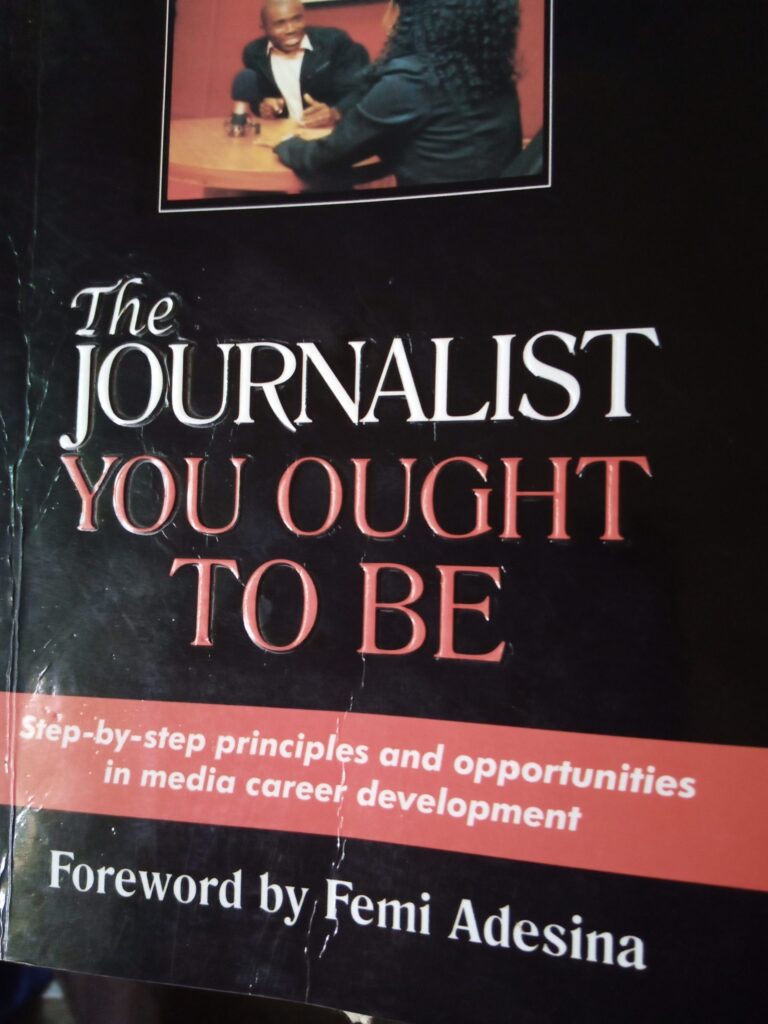Our intern from the Department of Mass Communication, Olabisi Onabanjo University, Olamide Ayoade reviews “The Journalist You Ought To Be” by media career development specialist, Lekan Otufodunrin.
If you want a book that offers a thorough exploration of media career development, blending practical advice with inspirational guidance, “The Journalist You Ought To Be” by accomplished journalist and media career development specialist, Lekan Otufodunrin is highly recommended.
This 182-page manual, with the foreword written by former Managing Director of SUN Newspapers and President of the Nigeria Guild of Editors, Mr Femi Adesina is an excellent resource for aspiring journalists and seasoned professionals alike.
The book covers a wide range of topics from career entry and skill development to navigating new media and achieving work-life balance. Each chapter provides actionable insights aimed at cultivating well-rounded and ethical journalists.
Otufodunrin brings a wealth of experience to the table as the Executive Director of Media Career Development Network. With over 35 years in journalism, Otufodunrin’s career includes significant roles such as Managing Editor at The Nation Newspapers and Group News Editor at The Punch. His extensive experience is complemented by his academic achievements, including a Bachelor’s and Master’s degree in Mass Communication from the University of Lagos and a Certificate in Advanced Digital Writing from Pan Atlantic University. Otufodunrin is also a fellow of notable media fellowships, including the Thomson Foundation, Cardiff, and the Poynter Institute, Florida, reflecting his deep commitment to journalism and media development.
The book is both practical and inspirational. It provides a step-by-step guide to becoming a successful journalist, offering clear advice on essential topics such as skill development, career strategy, and professional conduct. Otufodunrin’s guidance is rooted in real-world experience, making his recommendations both actionable and relevant. For instance, he emphasizes the importance of professional self-development, advising journalists not to wait for employers to provide all the necessary tools but to proactively seek out opportunities for self-improvement and career advancement.

A notable feature of the book is the inclusion of attestations and testimonials from individuals whom Otufodunrin has mentored. These personal stories add a layer of authenticity and demonstrate the impact of his guidance. Vincent Nzemeke, who had his first byline in a newspaper through Otufodunrin, highlights the author’s role in launching his career. Jennifer Ehidiamen’s story of being introduced to the ‘Dis Generation’ column on the pages of The Nation and maintaining it for five years underscores Otufodunrin’s influence on her professional development. Sunday Oguntola who he placed on a 3,000 naira monthly salary in the year 2000 was the first employed staff of Journalists For Christ (JFC). He began his journey from a modest beginning to achieving significant success further illustrating the long-term benefits of Otufodunrin’s mentorship. These examples not only showcase the practical value of his advice but also celebrate the real-world success of his mentees.
The book is structured to offer both theoretical insights and practical steps. It addresses a variety of topics, from the basics of entering the journalism field to more advanced concepts like applying for media fellowships and managing work-life balance. Otufodunrin draws from his own experiences and those of prominent international journalists, integrating ethical considerations and industry standards into his recommendations. His discussion on the Rotary International four-way creed, which aligns with journalistic ethics, provides a solid ethical framework for readers.
“The Journalist You Ought To Be” is an invaluable resource for anyone aiming to excel in journalism. Otufodunrin’s extensive experience and passion for the profession are evident throughout the book, making it a highly recommended read for journalists seeking to enhance their careers and achieve professional excellence.
READ ALSO: Nine journalists commence ACDJ’s Inequalities Reporting Fellowship

